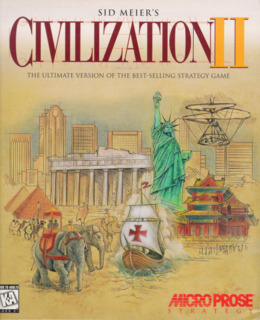A wonderfully addictive game with many compelling features. A great way to get started on the strategy genre.
Now, as I was so young, the main things that appealed to me in the game were the unit battles, watching the videos when I constructed a Wonder of the World, naming my cities, and upgrading my throne room. However, as I continued to play the game on and off for the next few years I started to get a taste for the educational side of the game as well. I wouldn't go so far as to say that my interest in history today is owed to Civ II, but I believe it contributed.
The game allows you to play as pretty much every early civilization that ever existed. Some nations (or factions, if you prefer) that exist today are not featured in the game such as Canada and Australia, though this is likely because they were originally colonies of the British Empire. However, you do have the option to create custom factions such as these at the start of the game. One of the disappointing sides of the game is that there are only about 4 early civilization visual design phenotypes. For example; Aztec and Native American cities will have the same adobe-style design, just as the Greeks and Americans share the Roman-style design. Also, once your civilization advances to the industrial age and beyond, each faction's city design will be exactly the same, with no cultural deviations in outward appearance unless you happen to have built a culturally-accurate Wonder.
Civ II does offer some unique properties on that note. Building Wonders of the World is not restricted to historically accurate factions, any nation or empire can build them. For example, you can have the Great Pyramids looming over Washington D.C. or have Shakespeare's theatre situated in Hong Kong. The Wonders you can build in the game also come with their own video segment that plays upon completion. While these videos are composed mainly of stock footage, most of them have heartfelt musical accompaniment that can really make you marvel at creations we often take for granted.
There is also a diplomacy factor to the game, whenever one of your units happens upon the unit of another faction, diplomatic relations are automatically initiated and a separate screen with an animated 3D ambassador from the other culture pops up along with a multiple choice options bar. Diplomacy/politics in Civ II centres a lot on bribery and threats (much like real life politics, I suppose) and you can often get what you want from your "friendly" neighbouring nations with a few well-placed monetary gifts or the threat of an ICBM attack. That's another thing, the first faction to successfully build and use a nuclear device in the game instantly gets a plethora of political backlash from the other factions that ranges from cease-fire requests to demands for sharing the technology. This can cause some bizarre situations though. Personally, I nearly fell out of my chair laughing when Montezuma demanded I give him nuclear capability.
On the home front, running your cities can be pretty straight forward and easy as all you really need to do is make sure there are enough farms around your cities to feed the populous. You can also micro-manage your cities so that they only allocate a set number of citizens to farming and a set number to entertain the masses or you can build trade caravans to pull in needed natural resources from neighbouring allied factions. There is also a FMV-driven council at your disposal that consists of your research, commerce, military, entertainment, and foreign affairs advisors. Each of which modify their appearance and opinions as your civilization progresses or as specific situations dictate. The council feature, in my opinion, was a very sophisticated feature to let non micro-manager players know what needed to be done while offering a fair bit of comic relief at the same time (especially in the case of the entertainment advisor, who closely resembles a certain late King of Rock 'n Roll).
To summarise; Civ II offers some great new features to the strategy genre and retains a high amount of addictiveness at the same time. It may fall short to those seeking accurate historical re-enactment, but that would be its only major shortcoming. I would highly recommend this game to anyone looking to get introduced to the genre.
**DISCLAIMER: This review was originally posted on 23 October 2005 under the user name TheSergeant. I have since closed that account in favour of my current one and re-posted my earlier contributions with minor spelling and informational edits.**

